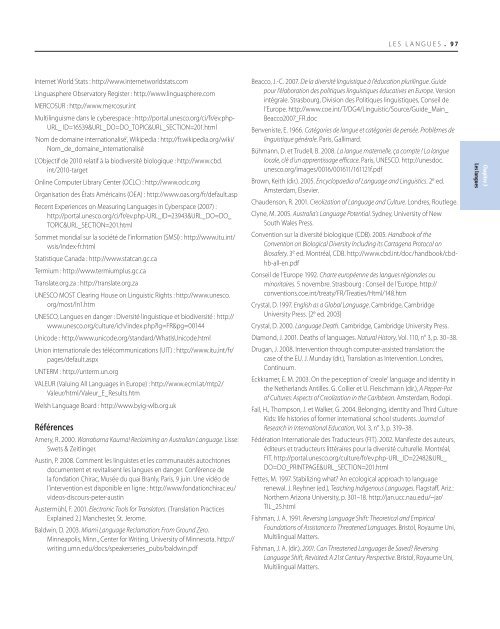Investir dans la diversité culturelle et le dialogue interculturel ...
Investir dans la diversité culturelle et le dialogue interculturel ...
Investir dans la diversité culturelle et le dialogue interculturel ...
You also want an ePaper? Increase the reach of your titles
YUMPU automatically turns print PDFs into web optimized ePapers that Google loves.
Les <strong>la</strong>ngues . 9 7<br />
Intern<strong>et</strong> World Stats : http://www.intern<strong>et</strong>worldstats.com<br />
Linguasphere Observatory Register : http://www.linguasphere.com<br />
MERCOSUR : http://www.mercosur.int<br />
Multilinguisme <strong>dans</strong> <strong>le</strong> cyberespace : http://portal.unesco.org/ci/fr/ev.php-<br />
URL_ ID=16539&URL_DO=do_TOPIC&URL_SECTION=201.html<br />
‘Nom de domaine internationalisé’, Wikipedia : http://fr.wikipedia.org/wiki/<br />
Nom_de_domaine_internationalisé<br />
L’Objectif de 2010 re<strong>la</strong>tif à <strong>la</strong> biodiversité biologique : http://www.cbd.<br />
int/2010-targ<strong>et</strong><br />
Online Computer Library Center (OCLC) : http://www.oclc.org<br />
Organisation des États Américains (OEA) : http://www.oas.org/fr/default.asp<br />
Recent Experiences on Measuring Languages in Cyberspace (2007) :<br />
http://portal.unesco.org/ci/fr/ev.php-URL_ID=23943&URL_DO=DO_<br />
TOPIC&URL_SECTION=201.html<br />
Somm<strong>et</strong> mondial sur <strong>la</strong> société de l’information (SMSI) : http://www.itu.int/<br />
wsis/index-fr.html<br />
Statistique Canada : http://www.statcan.gc.ca<br />
Termium : http://www.termiumplus.gc.ca<br />
Trans<strong>la</strong>te.org.za : http://trans<strong>la</strong>te.org.za<br />
UNESCO MOST C<strong>le</strong>aring House on Linguistic Rights : http://www.unesco.<br />
org/most/ln1.htm<br />
UNESCO, Langues en danger : Diversité linguistique <strong>et</strong> biodiversité : http://<br />
www.unesco.org/culture/ich/index.php?lg=FR&pg=00144<br />
Unicode : http://www.unicode.org/standard/WhatIsUnicode.html<br />
Union internationa<strong>le</strong> des télécommunications (UIT) : http://www.itu.int/fr/<br />
pages/default.aspx<br />
UNTERM : http://unterm.un.org<br />
VALEUR (Valuing All Languages in Europe) : http://www.ecml.at/mtp2/<br />
Va<strong>le</strong>ur/html/Va<strong>le</strong>ur_E_Results.htm<br />
Welsh Language Board : http://www.byig-wlb.org.uk<br />
Références<br />
Amery, R. 2000. Warrabarna Kaurna! Rec<strong>la</strong>iming an Australian Language. Lisse:<br />
Sw<strong>et</strong>s & Zeitlinger.<br />
Austin, P. 2008. Comment <strong>le</strong>s linguistes <strong>et</strong> <strong>le</strong>s communautés autochtones<br />
documentent <strong>et</strong> revitalisent <strong>le</strong>s <strong>la</strong>ngues en danger. Conférence de<br />
<strong>la</strong> fondation Chirac, Musée du quai Branly, Paris, 9 juin. Une vidéo de<br />
l’intervention est disponib<strong>le</strong> en ligne : http://www.fondationchirac.eu/<br />
videos-discours-p<strong>et</strong>er-austin<br />
Austermühl, F. 2001. E<strong>le</strong>ctronic Tools for Trans<strong>la</strong>tors. (Trans<strong>la</strong>tion Practices<br />
Exp<strong>la</strong>ined 2.) Manchester, St. Jerome.<br />
Baldwin, D. 2003. Miami Language Rec<strong>la</strong>mation: From Ground Zero.<br />
Minneapolis, Minn., Center for Writing, University of Minnesota. http://<br />
writing.umn.edu/docs/speakerseries_pubs/baldwin.pdf<br />
Beacco, J.-C. 2007. De <strong>la</strong> diversité linguistique à l’éducation plurilingue. Guide<br />
pour l’é<strong>la</strong>boration des politiques linguistiques éducatives en Europe. Version<br />
intégra<strong>le</strong>. Strasbourg, Division des Politiques linguistiques, Conseil de<br />
l’Europe. http://www.coe.int/T/DG4/Linguistic/Source/Guide_Main_<br />
Beacco2007_FR.doc<br />
Benveniste, E. 1966. Catégories de <strong>la</strong>ngue <strong>et</strong> catégories de pensée. Problèmes de<br />
linguistique généra<strong>le</strong>. Paris, Gallimard.<br />
Bühmann, D. <strong>et</strong> Trudell, B. 2008. La <strong>la</strong>ngue maternel<strong>le</strong>, ça compte ! La <strong>la</strong>ngue<br />
loca<strong>le</strong>, clé d’un apprentissage efficace. Paris, UNESCO. http://unesdoc.<br />
unesco.org/images/0016/001611/161121f.pdf<br />
Brown, Keith (dir.). 2005. Encyclopaedia of Language and Linguistics. 2 e ed.<br />
Amsterdam, Elsevier.<br />
Chaudenson, R. 2001. Creolization of Language and Culture. Londres, Rout<strong>le</strong>ge.<br />
Clyne, M. 2005. Australia’s Language Potential. Sydney, University of New<br />
South Wa<strong>le</strong>s Press.<br />
Convention sur <strong>la</strong> diversité biologique (CDB). 2005. Handbook of the<br />
Convention on Biological Diversity Including its Cartagena Protocol on<br />
Biosaf<strong>et</strong>y. 3 e ed. Montréal, CDB. http://www.cbd.int/doc/handbook/cbdhb-all-en.pdf<br />
Conseil de l’Europe 1992. Charte européenne des <strong>la</strong>ngues régiona<strong>le</strong>s ou<br />
minoritaires. 5 novembre. Strasbourg : Conseil de l’Europe. http://<br />
conventions.coe.int/treaty/FR/Treaties/Html/148.htm<br />
Crystal, D. 1997. English as a Global Language. Cambridge, Cambridge<br />
University Press. [2 e ed. 2003]<br />
Crystal, D. 2000. Language Death. Cambridge, Cambridge University Press.<br />
Diamond, J. 2001. Deaths of <strong>la</strong>nguages. Natural History, Vol. 110, n° 3, p. 30–38.<br />
Drugan, J. 2008. Intervention through computer-assisted trans<strong>la</strong>tion: the<br />
case of the EU. J. Munday (dir.), Trans<strong>la</strong>tion as Intervention. Londres,<br />
Continuum.<br />
Eckkramer, E. M. 2003. On the perception of ‘creo<strong>le</strong>’ <strong>la</strong>nguage and identity in<br />
the N<strong>et</strong>her<strong>la</strong>nds Antil<strong>le</strong>s. G. Collier <strong>et</strong> U. F<strong>le</strong>ischmann (dir.), A Pepper-Pot<br />
of Cultures: Aspects of Creolization in the Caribbean. Amsterdam, Rodopi.<br />
Fail, H., Thompson, J. <strong>et</strong> Walker, G. 2004. Belonging, identity and Third Culture<br />
Kids: life histories of former international school students. Journal of<br />
Research in International Education, Vol. 3, n° 3, p. 319–38.<br />
Fédération Internationa<strong>le</strong> des Traducteurs (FIT). 2002. Manifeste des auteurs,<br />
éditeurs <strong>et</strong> traducteurs littéraires pour <strong>la</strong> diversité <strong>culturel<strong>le</strong></strong>. Montréal,<br />
FIT. http://portal.unesco.org/culture/fr/ev.php-URL_ID=22482&URL_<br />
DO=DO_PRINTPAGE&URL_SECTION=201.html<br />
F<strong>et</strong>tes, M. 1997. Stabilizing what? An ecological approach to <strong>la</strong>nguage<br />
renewal. J. Reyhner (ed.), Teaching Indigenous Languages. F<strong>la</strong>gstaff, Ariz.:<br />
Northern Arizona University, p. 301–18. http://jan.ucc.nau.edu/~jar/<br />
TIL_25.html<br />
Fishman, J. A. 1991. Reversing Language Shift: Theor<strong>et</strong>ical and Empirical<br />
Foundations of Assistance to Threatened Languages. Bristol, Royaume Uni,<br />
Multilingual Matters.<br />
Fishman, J. A. (dir.). 2001. Can Threatened Languages Be Saved? Reversing<br />
Language Shift, Revisited: A 21st Century Perspective. Bristol, Royaume Uni,<br />
Multilingual Matters.<br />
Chapitre 3<br />
Les <strong>la</strong>ngues
















